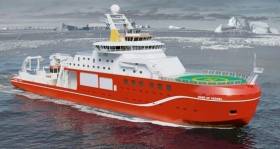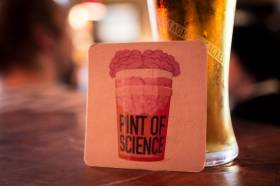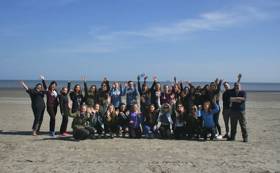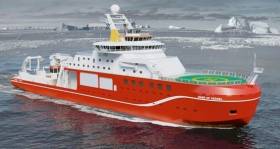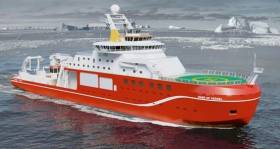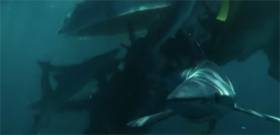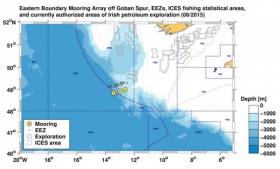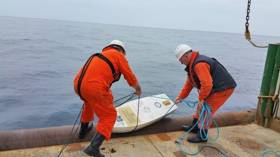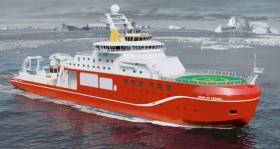Displaying items by tag: marine science
#BoatyMcBoatface - It's been confirmed that Britain's latest polar research vessel will not be named Boaty McBoatface despite that tongue-in-cheek moniker running away with the public vote in a controversial online poll.
Instead, the £200 million (€253 million) marine science vessel will carry the name RRS Sir David Attenborough in honour of the legendary natural history broadcaster, as the Evening Standard reports.
Sir David said he was "truly honoured" by the decision to name the vessel after him, coming on the eve of his 90th birthday.
The move comes after UK Science Minister Jo Johnson stepped in to save face for the National Environment Research Council (NERC) when Boaty McBoatface, suggested by a radio DJ as a joke, secured the highest share of votes.
However, the public's choice will not go completely unrecognised, – as the name is set to be given to one of the vessel's remote operated vehicles, or ROVs, used for undersea exploration. The Evening Standard has much more on the story HERE.
Meanwhile, the head of the NERC faces a grilling by Westminster MPs next week over how the Name Our Ship competition took such a farcical direction, as the Guardian reports.
'Pint Of Science' Marine Science Pub Talks In Galway Next Month
#MarineScience - Galway's Oslo Bar will host an evening of marine science talks on Tuesday 24 May as art of the international Pint of Science festival.
Taking place simultaneously over three evenings in May in Ireland, the UK, France, Italy, Spain, Germany, Austria, Canada, the USA, Brazil, Australia and South Africa, Pint of Science aims to encourage engagement with science beyond the lab or the lecture hall in the more approachable environment of a local pub.
The Oslo Bar in Galway city centre will host two evenings, one on the science of the human body on Monday 23 May, and a series of marine science topics from 7.30pm on Tuesday 24 May, MCed by Dr Nóirín Burke of the Galway Atlantaquaria.
Niall Keogh of GMIT will discuss the seabirds and cetaceans that populate Ireland's offshore waters, and Raissa Hogan of NUI Galway celebrates the diversity of Irish cold-water corals.
Representing INFOMAR and the Marine Institute, Oisín McManus will talk mapping the mountainous terrain that lies beneath the waves around Ireland, while Dr Tríona McGrath broaches the serious subject of ocean acidification.
For ticket information see the Pint of Science website HERE.
Bringing The Ocean Into The Classroom
#MarineScience - Dublin City University's St Patrick's Campus and the Marine Institute ran a pilot marine module with over 40 student teachers this week, giving them an opportunity to learn about teaching marine science and Ireland’s marine heritage.
Marine Institute chief executive Dr Peter Heffernan welcomed the collaboration with DCU to introduce themes relating to the marine environment into the science module.
“We recognise the unique position teachers have to help students develop an understanding of our amazing ocean resources," he said. "We hope these teachers will inspire curiosity among their students to learn more about the ocean and to develop an understanding of how we influence the ocean and how the ocean influences us.”
With a focus on a 'Marine Day' on 20 April on campus and in and the wider university, the oceans, seas and shorelines around Ireland present many opportunities to introduce marine themes into a range of cross curricular lessons,” explained Dr Thomas McCloughlin lecturer and lab manager of science at DCU's St Patricks Campus.
The Marine Institute provided a saltwater aquarium as well as a tidal tank for the modules, showing how bringing the seashore to the class provides an exciting way to learn about marine animals typically found on the seashore.
The programme was delivered to over 40 second- and third-year student teachers and included a field trip to the seashore and a range of interactive presentations in class.
“Student teachers get to explore the seashore through field trips as well as analysing specimens through examination and dissection in class. This allows them to integrate examining the biological themes of the marine as well as introducing social, physical-human and geographical influences relating to understanding and ocean resource,” said Dr Noirin Burke of the Galway Atlantaquaria, representing the Marine Institute’s primary school Explorers Education Programme.
Ireland has a seabed territory of approximately 880,000 sq km, 10 times greater than the size of the island of Ireland, making this one of the largest maritime member states of the European Union.
“Therefore, with Ireland being responsible for such a significant ocean resource, it is considered fundamental to teach Irish children, particularly as we are an Island nation, the historical and cultural values as well as the geographical and scientific backgrounds of our marine environment,” said Cushla Dromgool-Regan, responsible for the strategic development of education at the Marine Institute.
The pilot is supported by the Marine Institute and the Explorers Education Programme, which aims to build on Ireland’s marine and maritime heritage by increasing awareness of the value, opportunities and social benefits of our ocean wealth and identity.
The pilot was supported by Explorer Education Centres, Galway Atlantaquaria, Blackrock Education Centre and Sea Life Bray. For more information about the Explorers Education Programme see www.explorers.ie.
Marine Scientists To Raise A CommOCEAN In Belgium This December
#CommOCEAN - Whether you're a marine scientist keen to be speed-trained in modern ocean science communication skills or a communicator, working for a marine institute, NGO or governmental body, the CommOCEAN International Marine Science Communication event is for you.
Following on from the successful IMSCC-1, organised by CIIMAR, Ciencia Viva & EMBCP in 2014, the Bruges-Ostend CommOCEAN event is a unique opportunity to make a major leap forward in communicating your ocean knowledge.
The organisers (VLIZ, EMB, EMBCP, UNESCO-IOC-IODE) are developing an inspiring, innovative and interactive programme consisting of two separate events: a two-day conference in Bruges (6-7 December 2016), followed by a one-day high-level training programme at the InnovOcean facilities in Ostend (8 December 2016).
The call for contributions (orals, poster, workshop) is now open for the two-day conference. The organisers encourage the submission of abstracts from all areas of science communication with a special focus on the ocean, marine and estuarine realm.
The four major sessions of the conference are:
- The fundamentals of science communication/reaching out to the public.
- Optimising impact.
- Social media and graphics.
- Think out of the box: new formats and creativity.
In terms of ocean topics, there will be a special (but not restrictive) focus on marine climate change, ocean plankton/microbiota, deep sea exploration and ocean observation.
Three presentation formats are applicable for CommOCEAN 2016:
- Oral presentation in the main plenary program (12'+3' Q/A).
- Workshop interactive sessions in parallel groups (60').
- Poster presentation, displayed at a central location.
Abstracts must be submitted in English to [email protected] according to the guidelines and the template provided.
Please make sure that you indicate your preference for one or more of the three suggested formats: oral, poster, workshop. If submitting an abstract for a workshop, please indicate the planned format and content, including any logistical requirements.
Abstracts can be submitted until 1 June 2016 at the latest. For any questions relating to abstracts, contact [email protected].
Read more about the venues, the scope and the tentative programme at CommOCEAN.org
RIP 'Boaty McBoatface' As Minister Steps In To Save Face
#BoatyMcBoatface - Not so fast, Boaty McBoatface! Despite the public voicing their choice of name for Britain's latest marine research vessel, the UK's Science Minister has put the kibosh on that notion – to much disappointment online.
As reported yesterday on Afloat.ie, the head of the National Environment Research Council (NERC) was left with a dilemma after 'Boaty McBoatface' was the runaway winner in an public poll to name the £200 million (€253 million) polar research ship.
The online poll included nominations as worthy as Antarctic explorer Henry Worsley and renowned natural history broadcaster David Attenborough, and as smart-alecky as It's Bloody Cold Here.
But according to The Irish Times, the final decision rests with Science Minister Jo Johnson, who was diplomatic in saying that while the "imaginative" suggestions for names would be "reviewed", he favoured one that “captures the spirit of scientific endeavour”.
The reaction online has been swift, with the minister being branded an "anti-democrat, humorless spoilsport" for overruling the people, prompting some to call for the resignation of Prime Minister David Cameron.
That's according to the Huffington Post, who also quoted former Royal Navy head Admiral Lord West on the 'controversy'.
“It’s the typical thing of Brits going mad," he said, "normally silly season, not at this time of year."
#BoatyMcBoatface - The votes are in and 'Boaty McBoatface' is the clear choice in a public poll to name a new British polar research vessel, according to the Guardian.
As previously reported on Afloat.ie, bosses at the National Environment Research Council (NERC) were left red-faced by the popularity of the tongue-in-cheek name, one of a number of witticisms nominated by the public in an online pills to name its latest £200 million (€253 million) research ship.
Now NERC chief executive Duncan Wingham, who holds final say on the naming rights, is left with the difficult decision of whether to go with the popular choice, or preserve the credibility of the advanced polar research fleet among the marine science community.
As it turns out, it's not the first time that marine science has had an awkward brush with the public online – as an effort by Greenpeace to draw attention to whaling in the South Pacific led to a humpback whale being lumbered with the dubious monicker Mister Splashy Pants.
However, as the AV Club reports, that name ended up being to the benefit of Greenpeace's campaign against Japanese whaling – a subject back in the news after confirmation of hundreds of whale kills on a recent Antarctic expedition.
#MarineWildlife - Sharks have been filmed devouring a whale carcass at the ocean's surface in waters close to Britain and Ireland for the first time.
The results of the documentary expedition were broadcast last Friday as part of the UTV series Britain's Whales, available for catch-up the rest of this week.
As the Plymouth Herald reports, the groundbreaking experiment was headed by West Country marine biologist Dr Nicholas Higgs along with presenters Ellie Harrison and Ben Fogle, who sailed out to the Celtic Deep between Ireland, Cornwall and Wales with the carcass of a humpback whale in tow.
Their documentary crew were then able to film an "unprecedented" feeding frenzy by hundreds of blue sharks before the carcass was sunk for further study to examine the various creatures, from sharks to tiny 'zombie worms', that thrive on dead cetaceans as they drop to the ocean floor.
"I would never have predicted that you'd have this many sharks eating this much of the whale at the surface," said Dr Higgs. The Plymouth Herald has more on the story HERE.
In other cetacean news, Japan has disappointed global authorities by confirming hundreds of whale kills on its most recent expedition to the Antarctic.
Some 333 minke whales, including pregnant females, were poached between since December and last Friday (25 March), according to the Guardian.
As previously reported on Afloat.ie, Ireland recently joined an international demarche expressing "serious concern" at Japan's decision to resume whaling for what it claims are scientific purposes, claims that are not supported by the International Whaling Commission.
Marine Notice: Deployment Of Scientific Moorings At Goban Spur
#MarineNotice - The latest Marine Notice from the Department of Transport, Tourism and Sport (DTTAS) advises that the German Federal Maritime and Hydrographic Agency (BSH) and the University of Bremen will deploy three scientific deep-sea moorings at Goban Spur off the southwestern Irish shelf.
The work will be carried out by the German research vessel Maria S Merian (Callsign DBBT) and is expected to start on or around Sunday 3 April, lasting for approximately five days, weather permitting.
The top elements of all three moorings are yellow or orange in colour and carry flags as well as radio and Iridium beacons that only signal once the top element is at the surface. Scientific instruments are attached at different depths to ropes and chains. Sub-surface floatation bodies will keep the moorings upright.
As this is sensitive scientific equipment it is requested that fishermen and marine operators engaged in such activities as bottom trawling or laying of static gear avoid the locations concerned.
The moorings will be in place for a period of 12-15 months and will be positioned at the locations detailed in Marine Notice No 12 of 2016, a PDF of which is available to read or download HERE.
Mini Research Vessel Returns To The Sea
#CoastalNotes - Marine Institute researchers assisted marine technology students from Cape Fear Community College in the USA by deploying their miniature marine research vessel from the RV Celtic Explorer last Sunday 20 March.
The students in Cape Fear Community College’s boat building programme spent two months building Marlin Spikin’ Miller, which washed up on the shores of a Connemara island recently some eight months after being put to sea 6,000 miles across the Atlantic, as previously reported on Afloat.ie.
The boat is a miniature fibreglass sailboat designed to journey with the ocean winds and currents. It is embedded with a small satellite transmitter mounted on the deck and sends back data to the students which they use to monitor ocean and wind currents.
Cape Fear's boat building programme is unique in its kind and is part of a project in which a handful of schools across the USA are included.
Ciaran O’Donnell of the Marine Institute commented: “We are delighted to have this opportunity to play a role in this project and will look forward to seeing where the vessel will end up next.”
The Celtic Explorer launched the Marlin Spikin’ Miller at the most south-westerly point of the current blue whiting acoustic survey off the coast of Ireland.
The survey will run for another fortnight and will assess the size of the spawning stock of blue whiting in western waters. Ireland has participated in the international survey programme since 2004.
Acoustic data, age and maturity of blue whiting samples from all participants are combined to provide a measure of the relative abundance of the blue whiting stock.
The annual abundance estimate and stock numbers at age are presented to the ICES Working Group of Widely Distributed Stocks (WGWIDE).
#BoatyMcBoatface - The operators of a new British marine research vessel may be left red-faced as an online poll to name the ship has a clear favourite: Boaty McBoatface.
The tongue-in-cheek submission is far ahead of rival choices such as David Attenborough in the public vote to name the Natural Environment Research Council's (NERC) new polar research ship, as The Independent reports. SEE VIDEO BELOW.
And it's not the only witticism in the running, with Usain Boat, Ice Ice Baby and Notthetitanic also proving popular on social media ahead of the voting deadline on 16 April.
Whatever name it eventually gets, the £200 million (€253 million) vessel will carry up to 90 scientists and support staff on lengthy research voyages to the Arctic and Antartica, forming part of what NERC describes as "the most advanced floating research fleet in the world".
The Independent has more on the story HERE.



























